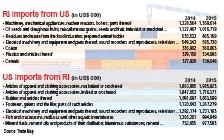Popular Reads
Top Results
Can't find what you're looking for?
View all search resultsPopular Reads
Top Results
Can't find what you're looking for?
View all search resultsUS to blame for its trade deficit
Change text size
Gift Premium Articles
to Anyone
T
he US Meat Export Federation has gone the extra mile to fly in a “butcher shop” packed with fresh cuts of prime beef and pork.
With its unique profile, the shop stood out at the Food and Hotel Indonesia fair at the Jakarta International Expo in Central Jakarta on Wednesday.
“US beef has been imported to Indonesia for over 20 years. In between, there were some stops due to some issues, but since last year, Indonesia has allowed the imports again,” said the federation’s ASEAN director, Sabrina Yin Foung May.
While promoting the quality of US beef compared to that sold in other countries, May stopped short of noting that the product was expensive and that only certain Indonesian consumers could easily afford it.
That premise has served as justification for Indonesian officials, who say uncompetitive US goods may in part explain the widening US deficit in trade with Indonesia.
US President Donald Trump last week called for an investigation into the “trade imbalance” between the US and 16 countries, including Indonesia.
Vice President Jusuf Kalla said late on Tuesday that he could not accept Trump’s accusation that Indonesia was among “cheating foreign importers.”
“The US should introspect about why Indonesia imports less from them. It is because their goods are very expensive,” he said.
“They cannot insist on labeling us as a cheater, because we’ve never forced them to buy our goods in the first place. They import our goods because of the high quality and the competitive price.”
Kalla said the US, as a champion of free trade and capitalism, should not renege on the values it pioneered, adding that Indonesia’s trade with the US had always complied with the rules of fair play put in place by the World Trade Organization (WTO).
Indonesia is in 15th place on Trump’s trade hit list, with a trade surplus of US$13 billion over the US, followed by Canada with a surplus of $11 billion. China tops the list with a $347 billion surplus, followed by Japan, Germany, Mexico, Ireland, Vietnam, Italy, South Korea, Malaysia, India, Thailand, France, Switzerland and Taiwan.
The bilateral trade figure provided by the US differs significantly from Indonesian Trade Ministry data, which put the surplus for last year at only $8.8 billion.
Indonesian exports to the US last year topped $16.14 billion, according to the ministry, making the US Indonesia’s biggest export destination with a share of 11.94 percent, followed closely by China with 11.49 percent and Japan with 10.06 percent.
Indonesia’s main import goods from the US, meanwhile, are machinery, mechanical appliances, power generation boilers and parts thereof, valued at a total of $1.36 billion in 2015, according to the International Trade Center’s Trade Map.
Apparel and clothing accessories, where Indonesia is among the world’s most competitive producers, accounted for the biggest share of the country’s exports to the US in 2015 at a value of $3.7 billion, according to Trade Map data.
Trump has given his administration 90 days to devise and implement a strategy for combating “violations of US trade and customs laws.” The policy may see customs agents use anti-dumping laws to crack down more effectively on foreign manufacturers who flood the market with underpriced products.
A possible penalty on Indonesian apparel would deal a blow to the archipelago.
(Read also: Trump puts Indonesia on trade hit list)
The industry is among the biggest providers of jobs, particularly for low and medium-skilled workers who account for more than 60 percent of the total workforce, according to Indonesia’s Central Statistics Agency (BPS). The agency revealed that some 1.4 million people were employed in the industry last year.
The US deputy chief of mission to Indonesia, Brian McFeeters, said there was no talk of punishment in relation to Trump’s recent executive order, as it was just an attempt to take a closer look at the hindrances to trade and how they could be resolved.
“It is a continuation of our policy where we’re always looking for maximum trade opportunity, lowering trade barriers in both directions [and assessing] how we can address issues. And that’s something that we work on all the time,” he said.
McFeeters cited tariffs and quotas as among the problems and said the US kept trying to work on those.
He said the deficit suffered by the US was not necessarily due to regulatory issues but might stem from demand as well.
The WTO’s dispute settlement body (DSB) ruled in December last year that a set of Indonesian measures affecting the importation of horticulture, animals and animal products failed to comply with the General Agreement on Tariffs and Trade (GATT), demanding that Indonesia adjust them.
The dispute mechanism was launched by the US and New Zealand.
Since 2012, Indonesia has applied a wide array of import measures, including restrictions on import gateways, periodic and fixed import terms and reference prices for certain food commodities.
The US and other trading partners consider these import arrangements as barriers to the import of fruit and vegetables, including apples, grapes and potatoes, animal products, primarily poultry and beef, and other agricultural produce, to the fastgrowing market.
US Vice President Mike Pence is slated to visit Jakarta in the coming weeks with trade issues likely high on the agenda.










